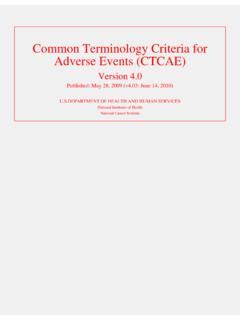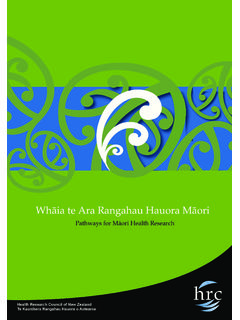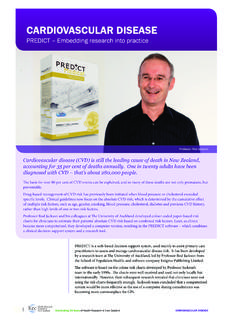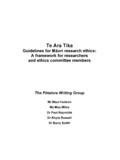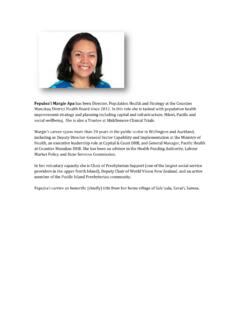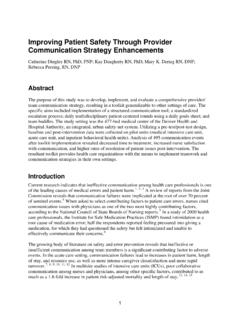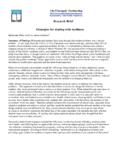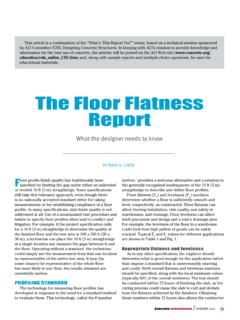Transcription of Health information privacy - HRC
1 1 Health information privacy Health research and privacy : Guidance notes for Health researchers and ethics committees Acknowledgements These guidance notes were prepared by Professor Charlotte Paul, Department of Preventive and Social Medicine, University of Otago; Grant Liddell, previous Senior Lecturer, Faculty of Law, University of Otago; and Professor Peter Skegg, Faculty of Law, University of Otago. These guidance notes are also available from Human Rights Law and Practice, March 1996 (1(4) p 196-210). 1. Introduction The Health information privacy Code 1994 (HIPC) is the starting point for any consideration of the privacy issues which arise in Health research. These guidance notes are provided to assist Health researchers and ethics committees, but they should not be relied upon as a substitute for the provisions of the HIPC. The notes have three functions: (a) to highlight matters in the HIPC which are especially relevant to Health research; (b) to provide guidance for Health researchers, ethics committees and custodians of Health information where the HIPC leaves them with discretion.
2 The guidance notes indicate matters which should be taken into account in making decisions in such cases; and (c) to deal with matters beyond the provisions or framework of the HIPC. The notes recommend good practice in the use of personal information for research, which goes beyond the requirements of the Code. The guidance about the matters which should be taken into account when making decisions, and the recommendations about good practice, reflect the judgments reached by a broadly based working party which in 1993 produced a draft code of practice for Health research. The draft code did not proceed but some of its provisions were incorporated in the HIPC, and some passages from the notes to the draft code now appear in the commentary which accompanies the 1994 code. However, much has not yet been utilised. Many of the judgments made by the earlier working party have been re-expressed here, in terms appropriate for a set of guidance notes and recommendations concerning good practice.
3 The writers have taken account of the international and other guidelines for ethical conduct of Health research. After providing guidance on the application of the HIPC to Health research, these notes deal separately with the collection, use and disclosure of Health information in Health research. 2 2. Application of the HIPC The HIPC applies where a Health agency deals with Health information . If a researcher is not a Health agency, or part of a Health agency, then, even though he or she might be dealing with Health information , the HIPC will not apply. (However, even if the researcher is not a Health agency, the record-holder usually will be, and the HIPC will apply to it.) In such a case, the researcher will need to apply the provisions of the privacy Act 1993 itself, which make different and in many cases lesser demands. (This section does not deal with those provisions.) The privacy Act is subject to other legislation. If a request for Health information is made by a person who is not the subject of the information , the request must be considered under the Official information Act.
4 Health agencies There are many bodies that fall within the definition of Health agency: (a) A Health agency is a person or body which provides Health or disability services. Usually a researcher will not be providing services. If, however, the researcher has a clinical or service providing role as well, then even though the information might be sought for research purposes, the researcher will fall within the definition of a Health agency, and thus will be governed by the HIPC; (b) Any purchaser of Health services is declared to be a Health agency. Any research carried out under its auspices will be subject to the HIPC; (c) A school, faculty, or department of a tertiary educational institution which provides the training or a component of the training necessary for the registration of a Health professional is a Health agency. This definition encompasses teaching functions. It is not clear whether it incorporates all the research functions of tertiary educational facilities that provide training; (d) Certain specified agencies are stated to be Health agencies.
5 These include the HRC. Health information Health information has at the core of its definition the notion that information relates to an identifiable individual. If information cannot be linked to an identifiable individual it will not come within the scope of the HIPC, or within that of the privacy Act itself. Health information is information about the Health of an identifiable individual. This includes: (a) the medical history of the individual; or (b) information about any disabilities the individual has or has had; or (c) information about any Health or disability services that are being provided, or have been provided to that individual; or (d) information provided by that individual in connection with the donation, by that individual, of any body part or bodily substance of that individual, or information derived from the testing or examination of any body part or bodily substance of that individual; or 3 (e) information about the individual which is collected before, or in the course of, and incidental to, the provision of any Health or disability service to the person.
6 Researchers should note that anonymised information which cannot be linked to any identifiable individual is not Health information , and thus is outside the reach of the HIPC. For the HIPC to apply in relation to Health research the researcher must be a Health agency; and the information must be Health information . If the research falls outside either of these definitions, the HIPC will not apply, but the privacy Act will if personal information is involved. The rules in the HIPC mostly apply from the date the HIPC commenced. This means that individuals can make complaints about failure to comply with the HIPC in relation to actions taken concerning their Health information from 30 July 1994. However, some of the rules in the HIPC expressly apply in relation to Health information obtained before the commencement date. These rules are: (a) Rule 5 (storage and security of Health information ); (b) Rule 6 (access to personal Health information ); (c) Rule 7 (correction of Health information ); (d) Rule 8 (accuracy etc.)
7 Of Health information to be checked before use); (e) Rule 9 (retention of Health information ); (f) Rule 10 (limits on use of Health information ) - does not apply to Health information obtained before 1 July 1993; and (g) Rule 11 (limits on disclosure of Health information ). 3. The collection of Health information Rules 1 to 4 and 12 of the HIPC are related to the collection of Health information . (a) Rule 1 - Purpose of collection of Health information The researcher should collect only information necessary for the research project: Rule 1(b). (a) Rule 2 - Source of Health information Health information may be collected for research purposes from sources other than the individual concerned, if approval by an ethics committee (if required) has been given, and so long as it will not be published in a form that could reasonably be expected to identify the individual concerned: Rule 2((2)(g)(iii). (b) Rule 3 - Collection of Health information from individuals Where a researcher is collecting information directly from the individual concerned, the researcher must take reasonable steps to ensure the individual knows that the information is being collected, why it is being collected, who will receive it, what consequences might follow if the information is not provided, and what are the individual s rights of access to and correction of the information : rule 3(1) (a) - (g).
8 It is not necessary to comply with this requirement if 4 compliance would prejudice the interests of the individual concerned or the purpose of collection: Rule 3(4) (b) (i) - (ii). (c) Rule 4 - Manner of collection of Health information Researchers must not collect Health information by means that are unfair or that intrude to an unreasonable extent upon the personal affairs of the individual concerned: Rule 4(b) (i) - (ii). (d) Rule 12 - Unique identifiers Health agencies must not assign a unique identifier to an individual unless to do so is necessary to enable the Health agency to carry out its functions efficiently: rule 12(1). A unique identifier is something (other than the person s name) that uniquely identifies that individual. This will usually be some sort of alpha-numeric code. Note that the rule regulates assignment not use of unique identifiers. Thus where researchers have collected Health information to which another agency has already assigned a unique identifier, the HIPC does not prevent the researcher s use of that same unique identifier.
9 Where there is no practical way for a unique identifier to be linked to an individual or where a unique identifier has been subject to an irreversible encryption process, the identifier may be regarded as anonymised information . The use of unique identifiers can enhance individual privacy where the unique identifier replaces other identifying information , and thus diminishes the possibility of unauthorised persons breaching the individual s privacy . However, the HIPC contains safeguards against overuse or abuse. Guidance on discretionary matters Ethics committee approval is required in order to rely on the exception for research in Rule 2, relating to the collection of Health information from sources other than the individual concerned. This may be either from another individual or from Health records. These two situations are discussed separately below. (a) Collection of information from another individual Where the researcher proposes to collect information from someone else, then this should be with the authority of the individual concerned, except in special circumstances.
10 For instance if the researcher proposes to collect personal information from a relative or someone else, without the authority of the individual concerned, because that individual is deceased, untraceable, incapacitated, or for some other good reason, then this approach should be explained in the protocol for the ethics committee, and carried out in accordance with any conditions the committee specifies. (b) Collection of information from Health records The use of Health records for research without the authorization of the individual concerned should only be undertaken subject to certain extra conditions: 1. Justification The reasons for not seeking consent should be justified to the ethics committee. These reasons may be scientific, practical or ethical. 5 The main scientific reason for not seeking consent to use Health records for research is that failing to locate individuals to seek their consent may lead to less complete ascertainment of cases for study, and therefore possibly a biased (and hence incorrect) result.
